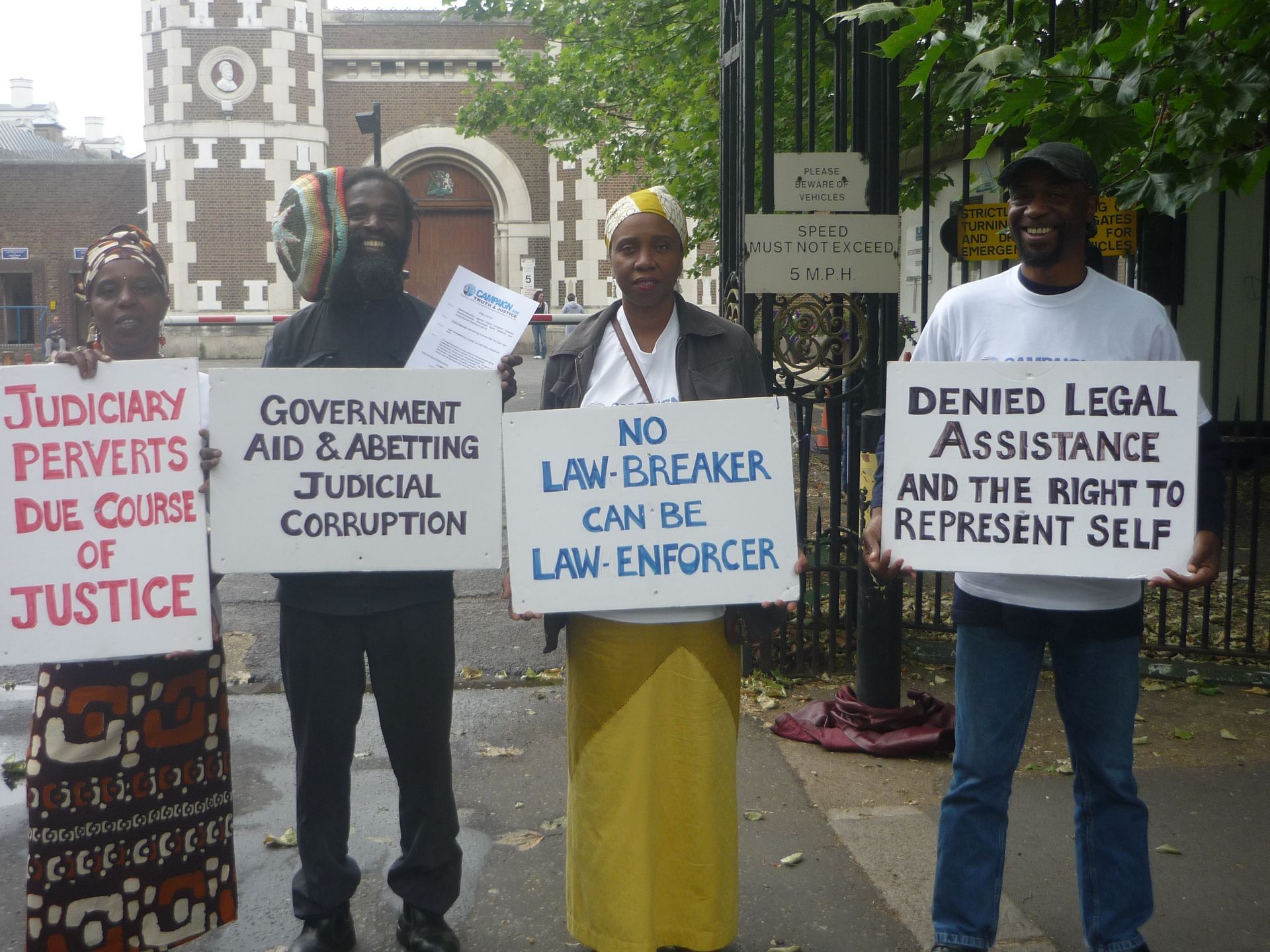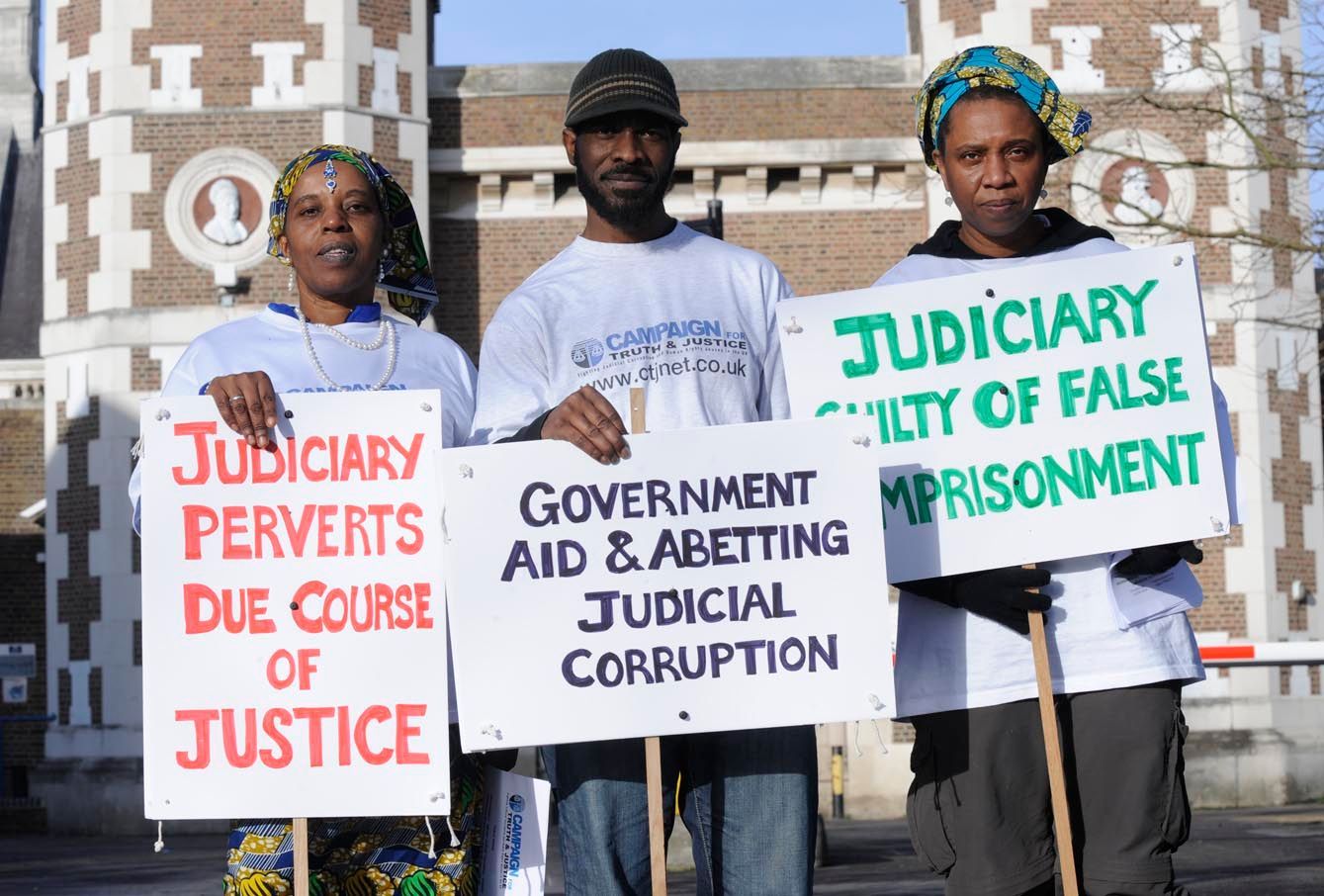Malicious Prosecutions and False Arrest by the Metropolitan Police Department !!!
New Paragraph
What is Malicious Prosecution
Malicious prosecution is the wrongfully subjection of an individual or groups of people to a criminal or civil legal proceeding without reasonable grounds, other than malice or an improper purpose, by the Police, or a Prosecuting authority. It is often a wrongful legal action taken with malice and without sufficient grounds, leading to harm for the person subjected to the prosecution.
Key elements of malicious prosecution by a police department include:
1. Initiation or Continuation of Legal Proceedings:
Police officers or the department must have initiated or played a significant role in continuing criminal charges or proceedings against the individual.
2. Lack of Probable Cause:
The officers must have acted without probable cause, meaning there was no reasonable basis to believe that the individual committed the alleged crime. This can involve ignoring exculpatory evidence, fabricating evidence, or relying on unreliable witnesses.
3. Malice:
The officers must have acted with malice, which involves an improper motive such as personal animosity, bias, or an intent to harm the individual. This can include actions taken out of spite, retaliation, or to achieve a personal or departmental goal.
4. Favourable Termination:
The criminal proceedings must have ended in a manner that is favourable to the individual, such as an acquittal, dismissal of charges, or a finding of not guilty, indicating that the charges were unfounded.
5. Damages:
The individual must have suffered harm as a result of the malicious prosecution. This can include emotional distress, damage to reputation, legal costs, loss of employment, and other personal or financial harms.
Malicious Prosecutions, Detentions and False Arrests, (of Campaign for Truth and Justice Members) to FORCIBLY Extinguish all Legitimate Demands for Systemic Accountability and Redress
As a result of the Metropolitan Police Department’s reluctance to record and investigate Judicial Criminal Corruption Complaints against violating members of the Judicial establishment, the members of Campaign for Truth and Justice held a sustained Community Affirmative Action Campaign programme outside London Police Stations and Court Venues in order to bring publicity and awareness to the Judicial Authority’s Criminalities and Law-breaking.
The Campaign’s targeted Actions, highlighting the Judiciary’s criminal violations and the Metropolitan Police Department’s hypocritical Inactions, Failures, and Omissions culminated in the members FALSE ARREST, UNLAWFUL DETENTIONS, and IMPRISONMENTS; solely aimed at fragmenting the organisation and extinguishing all legitimate demands for accountability and redress sought off the the Judiciary and the Metropolitan Police Department.
Frustrated by the Campaign and its members' readiness to pursue Civil and Criminal Court action by any means necessary to compel the Judicial Authorities to enforce victims' rights to redress and compensation under Section 7(1)(a) HRA 1998 and Article 5.5 HRA 1998, (albeit rights that were unlawfully blocked and ignored by the establishment) the Metropolitan Police Department adopted Malicious Prosecution of Campaign for Truth and Justice members as a counter offensive strategy.
These then is demonstrative of some of the Malicious Prosecutions, False Arrest and Unlawful Imprisonments, I was subjected to during the course a rightful demand for Institutional Accountability and Redress whilst performing the role of the active SECRETARY of Campaign for Truth and Justice.
Malicious Prosecution Case 1: Assault Occasioning Actual Bodily Harm and Dangerous Driving
Facts:
- Charges: Assault Occasioning Actual Bodily Harm and Dangerous Driving.
- Case No: T20030230
- Date of Acquittal: 7th April 2003.
- Court: Snaresbrook Crown Court.
- Outcome: Acquittal by jury.
Argument:
The prosecution of this case was founded on flawed and insufficient evidence without probable cause. Other than failing to meet the requisite standard for securing a criminal conviction, the Metropolitan Police Department initiated the PROCEEDINGS out of sheer MALICE, FRUSTRATION and EMBARRASSMENT particularly because of the DEFENDANT'S persistent and unrelenting dedicated demands that the Metropolitan Police Commissioner, (Ian Blair) Record and Investigate his Department's APPARENT involvement in the execution of a FALSE and UNLAWFUL Warrant issued OUTSIDE the Rule of Law by JUSTICE TOULSON in an elaborate WHITE COLLAR CRIME SYNDICATE, Criminal Conspiracy to KNOWINGLY deny Justice and consequent resulting FALSE and UNLAWFUL IMPRISONMENTS.
The acquittal by a jury of ordinary members of the public underscores the lack of credible evidence to support the charges. The initiation of the prosecution appears to have been driven by an ulterior motive to harass and intimidate the Campaign members, most particularly the active Secretary and thereby constituting malicious prosecution. This case demonstrates a clear abuse of legal process by the Metropolitan Police Department, aimed at discrediting and disrupting the activities of the Campaign.
Malicious Prosecution Case 2: Having Article with Blade
Facts:
- Charges: Having Article with Blade.
- Case No: T20050199
- Date of Acquittal: 22nd July 2005.
- Court: Inner London Crown Court.
- Outcome: Acquittal by jury.
Argument:
The prosecution lacked credible evidence on having stopped the Defendant (along with one other colleague, Paul Dominic seated in the front passanger seat) for no probable cause whilst driving home in a clearly marked and Sign-written COMMERCIAL Van he owns, minutes after completing work for RECORDED PICTURE COMPANY on Hanway Street, Tottenham Court Road. The unwarranted and unjustified STOP resulted in an eventual search of the commercial van containing Tools and Equipments amidst whence a small work knife used for various miscellaneous task was unearthed from the vehicle by an Officer claiming it to be a millimetre or two above the lawful legal limit.
Having no probable cause (like non display of a valid Road Tax, etc,. often generally used then to justify DISPROPORTIONATE Vehicle Stops carried out on Black African and Caribbean people) nor INTELLIGENT LED explanation for the STOPPAGE itself to justify conducting a SEARCH of the Vehicle; the Metropolitan Police Department INITIATED PROCEEDINGS out of MALICE, knowing full well that the knife was in a Sign-Written Commercial Vehicle, for use with LAWFUL EXCUSE as part of Work Tools and therefore had COMMON SENSE BEEN ENGAGED, should not have continued with a Criminal Charge.
The eventual acquittal by a jury showed that the evidence presented by the prosecution was not only INSUFFICIENT but also HIGHLY EXAGGERATED with potential fabrications purposely thrown-in for maximum impact aimed to MALIGN the defendant and the Community's Justice pursuits. The Metropolitan Police Department’s actions in this case illustrate a misuse of prosecutorial power, warranting a claim for malicious prosecution.
Malicious Prosecution Case 3: Physical Assault
Facts:
- Charges: Physical Assault of former partner Natasha Sherina Paton.
- Case No: CJ88116
- Date of Dismissal: 3rd May 2014.
- Court: Camberwell Green Magistrates’ Court.
- Outcome: Case Dismissed with a Not Guilty Verdict.
Argument:
The FIRST of many efforts by the UK Judiciary, the Metropolitan Police Department and the Home Office, to use underhand tactics to secure Criminal Conviction culminating in Custodial Sentencing and eventual DEPORTATION from the UK; so as to EXTINGUISH all JUSTICE and REDRESS DEMANDS of Campaign for Truth and Justice Community, utilising CLOSE PARTNER RELATIONSHIP Tools to engineer Live-in Partner and Visa Overstayer (Natasha Sherina Paton) into propagating Assault Complain Allegations leading to CRIMINAL CHARGES and PROSECUTION.
The charges in this case were dismissed outright by the court, indicating a profound lack of evidence to sustain the prosecution. The timing and nature of the charges suggest an attempt to exploit personal relationships to further discredit and destabilise the defendant. The dismissal of the case underscores the baseless nature of the allegations and the malicious intent behind the prosecution. This incident serves as a clear example of the Metropolitan Police Department’s pattern of engaging in malicious prosecution to thwart the Campaign’s efforts for justice and accountability.
Malicious Prosecution Case 4: Intimidating a Witness, Common Assault, and Threatening with a Knife
Facts:
- Charges: Intimidating a Witness, Common Assault, Threatening with a Knife.
- Case No: T20140357
- Date of Acquittal: 22nd October 2014.
- Court: Inner London Crown Court.
- Outcome: Acquittal by jury.
Argument:
The defendant faced multiple charges VINDICTIVELY marshalled up for maximum impact in terms of long custodial sentence hopes of the establishment, along side an wholly concocted INTIMIDATING WITNESS charge craftily woven in so as to totally discrediting all accusations of INSTITUTIONAL CORRUPTION CULTURE and CRIMINAL PERVERSION OF JUSTICE allegations levelled at both the Metropolitan Police Department and the Judiciary of England and Wales by the DEFENDANT since 2001.
With each Charge on INDICTMENT lacking substantial evidence to support a conviction, the Crown Court Judge's decision to Stop the Trial Midway through the Hearing and AQUIT on all counts reflects the Metropolitan Police Department and the Crown Prosecution Service's, prior COACHING and INTIMIDATION of a scared UK Visa Overstayer and Live-in Partner (Natasha Sherina Paton) covertly coerced and recruited under threat of Detention, Deportation and Imprisonment, to file False Claims and Allegations of '... threatening with a Knife to the throat ...' in return for leniency, help and assistance with submitting her Home Office Application to remain in the UK and not have to part with her children born here to a FATHER who is a BRITISH CITIZEN.
The decision to bring these charges appears to be a strategic manoeuvre to intimidate and silence the defendant, in hope of eventual DEPORTATION on securing CONVICTION and substantial custodial sentence, indicative of malicious intent. This case highlights the pattern of the Metropolitan Police Department’s misuse of the criminal justice system to target and disrupt the Campaign’s operations, substantiating a claim for malicious prosecution.
In summary, these four Cases collectively demonstrate there are systemic issues within the Metropolitan Police Department, where malicious prosecution was deployed as a tactic to suppress and dismantle the Campaign for Truth and Justice's pursuit of Accountability and Redress. The repeated pattern of baseless charges and subsequent acquittals or dismissals underscores the necessity for legal redress and accountability for such prosecutorial misconducts.
Failure to Provide Redress and Compensation Following Acquittal Constitutes Unlawful Detention
Furthermore, the Metropolitan Police Commissioner’s failure to provide redress and compensation following the total acquittal of all serious charges at trials before a jury constitutes an extension of unlawful detention. It violates fundamental legal principles and human rights protections, including the right to liberty, security, and an effective remedy.
This failure not only perpetuates the injustice experienced by the acquitted individuals but also undermines the integrity and accountability of the justice system. Ensuring redress and compensation is not only a legal obligation but also a crucial step in restoring justice and maintaining public trust.
1. Right to Liberty and Security:
- Human Rights Act 1998 (HRA): Article 5 of the HRA guarantees the right to liberty and security. It mandates that any deprivation of liberty must be lawful, and individuals who have been unlawfully detained are entitled to compensation.
- Article 5.5 HRA 1998: This article specifically states that victims of unlawful detention have an enforceable right to compensation.
2. Principle of Accountability:
- Judicial Acquittal: An acquittal by a jury signifies that the defendant has been found not guilty of all charges. This outcome should prompt an immediate review of the detention’s legality and an obligation to provide redress and compensation for any unlawful detention.
- Accountability of Authorities: The failure to provide redress undermines the principle of accountability, which requires that authorities acknowledge and rectify wrongful actions, especially when they result in deprivation of liberty.
3. Redress and Compensation:
- Legal Obligations: Following an acquittal, the Metropolitan Police Commissioner is legally obligated to compensate the individual for wrongful detention, as stipulated under Section 7(1)(a) HRA 1998.
- Moral and Ethical Duty: Beyond legal requirements, there is a moral obligation to restore the individual’s dignity and address the harm caused by the wrongful detention.
4. Unlawful Detention:
- Extended Unlawful Detention: The initial detention, followed by a failure to provide redress after acquittal, constitutes an ongoing violation of the individual’s rights. It prolongs the unlawful nature of the detention by denying justice and compensation.
- Violation of Due Process: Failing to address wrongful detention and provide compensation disregards the due process guaranteed under the law, perpetuating the injustice suffered by the acquitted individual.
5. Human Rights Violations:
- Right to Effective Remedy: Under international human rights law, particularly the European Convention on Human Rights (ECHR), individuals have the right to an effective remedy for violations of their rights. This includes compensation for wrongful detention.
- Continued Harm: The lack of redress exacerbates the harm suffered, as the individual remains without acknowledgment of the wrongful detention and its impacts.
Compelling Arguments Against the Metropolitan Police Commissioner for Misfeasance
Finally I wish to addresses the issue of misfeasance by the Metropolitan Police Commissioner, asserting that the Commissioner has wilfully engaged in or permitted wrongful conduct within their official capacity, resulting in harm or loss to myself and other Campaign for Truth and Justice members for over two decades.
Utilising the Four Cases outlined earlier, it’s not difficult to sustain a LAWFUL argument that the Metropolitan Police Commissioner’s actions and omissions constitute misfeasances, entailing the wilful and unlawful execution of authority.
In each distinct scenarios involving arrests, charges, prosecutions, and subsequent acquittals, each case highlights how the Commissioner’s failure to ensure proper conduct and adherence to legal standards resulted in significant harm and loss constituting misfeasance.
1. Mett. Pol1: Wrongful Arrest, Charge, and Prosecution Leading to Acquittal
Scenario: On 7th April 2003, an individual was arrested, charged, and prosecuted for one count of Assault Occasioning Actual Bodily Harm and a second count of Dangerous Driving. The trial took place at Snaresbrook Crown Court, Case No: T20030230, where the individual was acquitted by a jury.
Argument: The wrongful arrest and prosecution of the individual demonstrate a clear failure by the Commissioner to ensure that charges were based on solid evidence. The acquittal indicates that the prosecution lacked merit, suggesting that the arrest and charge were executed with negligence or possibly malicious intent. This constitutes misfeasance, as the Commissioner permitted or failed to prevent actions that unlawfully deprived the individual of their liberty and caused significant distress.
2. Mett. Pol2: Unjust Prosecution for Possession of a Blade
Scenario: On 22nd July 2005, an individual was arrested, charged, and prosecuted under one count of Having Article with Blade at Inner London Crown Court, Case No: T20050199. The jury acquitted the individual.
Argument: The prosecution’s inability to secure a conviction despite the serious nature of the charge suggests that the case was brought forward without sufficient evidence or proper investigation. The Commissioner’s oversight in allowing this charge to proceed demonstrates a reckless disregard for the legal standards required for prosecution. This misfeasance has caused undue harm to the individual, infringing upon their rights and causing unwarranted reputational damage and emotional distress.
3. Mett. Pol3: Unfounded Physical Assault Charge
Scenario: On 3rd May 2014, an individual was arrested, charged, and prosecuted for one count of physical assault against former partner Sherina Paton at Camberwell Green Magistrates’ Court, Case No: CJ88116. The case was dismissed with a verdict of Not Guilty.
Argument: The dismissal of the case by the court signifies that the charge was unfounded and lacked sufficient evidence. The Commissioner’s failure to ensure that charges were based on substantial and credible evidence before proceeding to trial constitutes misfeasance. This improper execution of duty has resulted in the individual facing unnecessary legal battles, financial strain, and damage to personal reputation.
4. Mett. Pol4: Multiple Charges Without Merit
Scenario: On 22nd October 2014, an individual was arrested, charged, and prosecuted for one count of Intimidating a Witness, one count of Common Assault, and one count of Threatening with a Knife at Inner London Crown Court, Case No: T20140357. The jury acquitted the individual of all charges.
Argument: The multiple charges brought against the individual, all leading to acquittal, indicate a systemic failure within the police department to properly assess the validity of the charges before proceeding with prosecution. The Commissioner’s responsibility includes ensuring that such charges are substantiated by credible evidence. The failure to do so, resulting in wrongful prosecution, is a clear example of misfeasance. This has caused the individual undue hardship, legal expenses, and emotional trauma, all of which could have been avoided with proper oversight.
In each of the four scenarios, the Metropolitan Police Commissioner’s failure to ensure that charges were based on solid evidence and conducted with due diligence constitutes misfeasance. The wrongful arrests, prosecutions, and subsequent acquittals highlight a pattern of negligence or wilful misconduct, causing significant harm and loss to the individuals involved. These actions violate fundamental legal principles and human rights protections, underscoring the need for accountability and reform within the Metropolitan Police Department to prevent future occurrences of misfeasance.



